Published on December 20, 2021 by Yamini Bhalla
Introduction
“Greenland's ice summit witnessed rainfall for the first time in history; scientists worry about climate change” – news on 23 August 21
Do such headlines worry you? We have seen extreme weather conditions across the globe in recent months, including record-breaking temperatures, flooded cities, landslides and forest fires. The Intergovernmental Panel on Climate Change (IPCC) released a report confirming that human-induced climate change is extensive and intensifying, and some trends are now irreversible.
Of the human-induced global greenhouse gas (GHG) emissions, more than one-third can be attributed to our food systems, primarily due to agriculture (livestock, soil), land use and forestry [as land areas and forests act as a sink (absorb CO2 from the environment) or a source of GHG emissions], fertiliser use and other processing, refrigeration and downstream activities.

In this note, we understand what a plant-based diet is, why it is a more sustainable choice and how this market has grown during the pandemic.
What is plant-based food?
Plant-based food products are finished products consisting of ingredients such as vegetables, fruits, grains, nuts and seeds, all sourced from plants. Based on product type, the plant-based food market is segmented into dairy alternatives, meat substitutes, egg substitutes, confectionery and others. Based on source, it is segmented into almond protein, soy protein, wheat protein, pea protein and rice protein.
Why is it sustainable?
Simply put, growing food – whether crops or raising livestock for consumption – requires resources, including land, water and manpower. Livestock also requires land for grazing and land to grow animal feed. The chart below shows GHG emissions of and land use for producing various grains, fish, eggs, beef and lamb; it is clear that plant-based food is less resource-intensive.

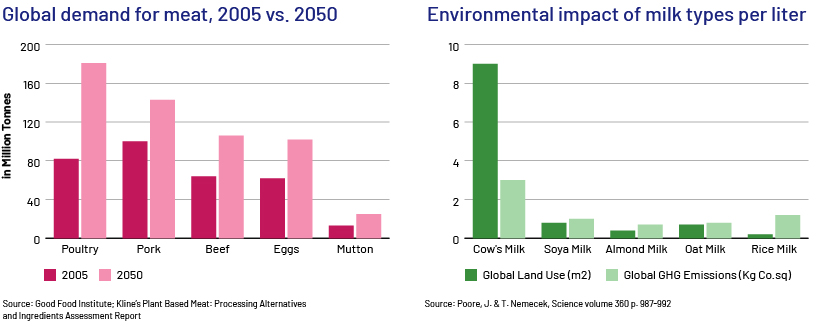
The following facts about meat consumption further confirm it is resource-inefficient:
-
Around 320m tonnes of meat are consumed annually across the globe
-
The world’s population is estimated to reach 9.7bn by 2050, when global demand for meat is expected to reach 557m tonnes
-
Ruminant animals such as cows and goats emit methane (GHG) as they digest animal feed, grass or plants
-
Nitrous oxide, another GHG, is released from the chemical fertilisers used for crops produced for cattle feed and also from ruminant animal waste
-
Raising livestock accounts for c.14.5% of all GHG emissions. “Livestock production is the most prominent methane contributor in the world and is responsible for the emission of more greenhouse gases than all the world’s transportation systems combined”, according to the Down to Earth Organization
-
By 2050, food-related GHG emissions are expected to reach 11.4 gigatons of CO2-equivalents (GtCO2-eq), of which c.7.3 GtCO2-eq, almost two-thirds, would come from meat
-
Beef needs c.20x more land and emits 20x more GHG emissions per gram of edible protein than plant-based proteins
-
As the global population increases, demand for beef increases, requiring more land and pastureland, usually created by deforestation, which releases CO2 stored in forests
-
Most of the world’s grasslands are already heavily used for livestock production; increased beef demand will increase the pressure on forests
-
A report from the World Wildlife Fund (WWF) finds that 60% of global biodiversity loss is caused by meat-based diets
-
Half of all water consumed in the US is used to grow grain for cattle feed
-
Meat consumption also leads to a global food crisis, as almost half of the global harvest is fed to animals; this could instead be used to feed the growing population, expected to reach c.9.7bn by 2050
-
Two to three calories of fossil fuel are required to produce 1 calorie of protein from soybeans, corn or wheat, whereas, for beef, it takes 54 calories of fuel to produce 1 calorie of beef protein

While alternative approaches to farming and raising cattle have reduced the emission of harmful gases, more use of these methods is unlikely to fill the gap between the resources required to produce plant-based food and the resources required to produce beef.
The plant-based food market
Amid this harsh reality, let’s look at the positive trends that emerged in food consumption patterns amid the pandemic:
-
Sales of plant-based food exceeded USD7bn in the US in 2020; the US vegan food market was up by 27%, growing almost two times as fast as the total US retail food market, which increased by 15%
-
Sales of plant-based milk (the largest plant-based food category) reached USD2.5bn in 2020 and accounted for 35% of the total plant-based food market in the US
-
The value of plant-based meat (the second-largest plant-based food category) reached USD1.4bn in the US in 2020, growing twice as fast as the value of traditional meat
-
The global plant-based food market was valued at USD29.4bn in 2020 and is expected to reach USD162bn within the next decade, a 451% increase
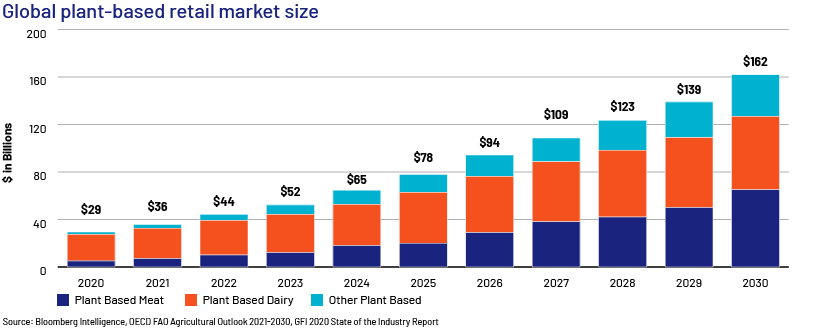
Why demand is increasing
-
Rising intolerance of cruelty to animals: 72bn animals are slaughtered every year for consumption; 95% of them are chickens, over 300m cattle and 1.5bn pigs
-
Increasing health consciousness: The pandemic has made people more health conscious and aware of how their food habits impact their health as well as the environment. Plant-based diets are said to be more nutritious and gut-friendly, increase fibre, help maintain weight and reduce the risk of cancer
-
Increasing vegan and flexitarian population: Around 5% of the world’s population is vegan, and the numbers are rising. In addition to vegans and vegetarians, there are flexitarians, referring to those who mostly consume plant-based foods but also animal products, adding to the demand
-
Increase in alternative food options with venture investments: Venture investments in plant-based food companies grew almost 3x – from USD660m in 2019 to USD2.1bn in 2020. Companies such as Impossible Foods, Oatly, Meatless Farms and Green Monday had notable rounds of investment in 2020
-
2020 saw the launch of venture funds focused on and supporting alternative protein and the food tech/innovation segment, including Lever VC, Veg Capital and Rich's Corporate Venture
-
Some companies had successful IPOs, including Else Nutrition, Oatly, Impossible Foods, The Very Good Butchers and SavorEat
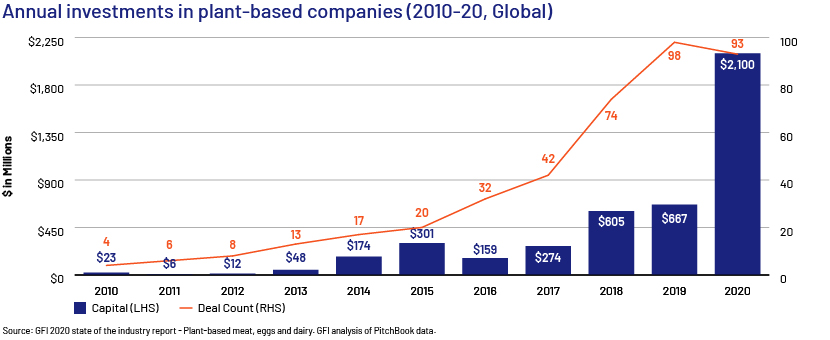
-
Liquidity events or exits in the form of M&A, buyouts or IPOs in the plant-based food market have also gained momentum in recent years
-
The largest deal was Danone’s acquisition of WhiteWave Foods, a plant-based milk market leader that operated the Silk brand, for USD12.5bn in 2017
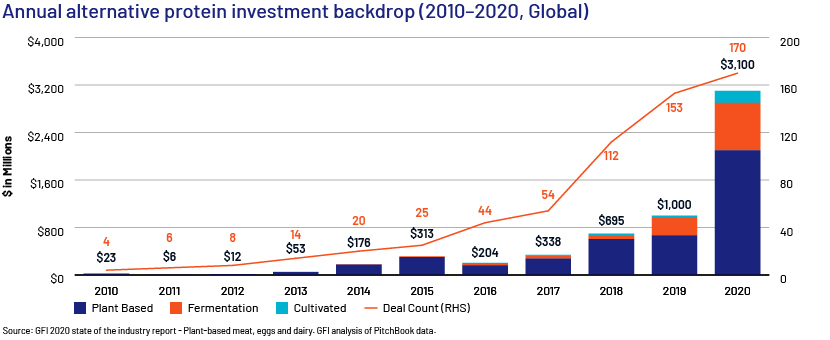
-
-
-
Growing availability of alternative options: Companies such as Beyond Meat, Impossible Foods, Else Nutrition and Oatly are leaders in the plant-based food market. Their offerings are becoming increasingly competitive with animal products on key attributes such as taste, price and accessibility
-
These companies have also formed partnerships with stores, restaurants and large retail chains to make their products available and popular. It is interesting that with proven demand for plant-based options, food giants such as Kraft Heinz, Tyson Foods, Kroger and Nestlé are also establishing and expanding their plant-based food offerings in this fast-growing market
-
The rise of foodtech and alternative protein options: Also complementing growth in this market is innovation in the foodtech segment, paving the way for better plant-based options and alternative proteins. With technologies such as 3D printing, shear-cell technology, cellular agriculture and fermentation, companies are progressing towards developing animal-free protein. These companies are also gaining the support of corporate venture arms such as Rich Products’ Rich's Corporate Venture Group, Tyson Ventures and Kellogg’s corporate venture capital arm
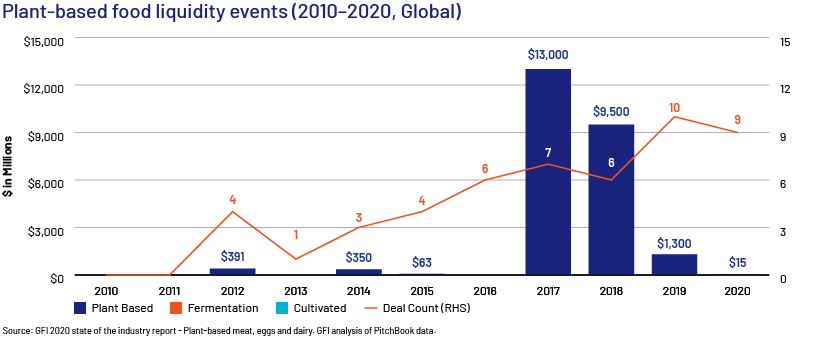
-
Challenges and solutions
While the current situation demands positive steps, the plant-based food industry is still in the initial phase, facing challenges relating to demand/supply, acceptability of plant-based diets, cost to the consumer and plant-based food being highly processed and low on nutritional value compared to traditional proteins.
Food is a personal choice, and although it is not viable to shift entire populations to adopting vegan or vegetarian diets, IPCC reports suggest that a balanced diet comprising plant-based food and sustainably produced animal-sourced food has the potential for adoption while generating significant co-benefits in terms of human health.
Scientists estimate that by 2050, dietary changes could free up several million square kilometres of land and reduce global CO2 emissions by up to 8bn tonnes per year.
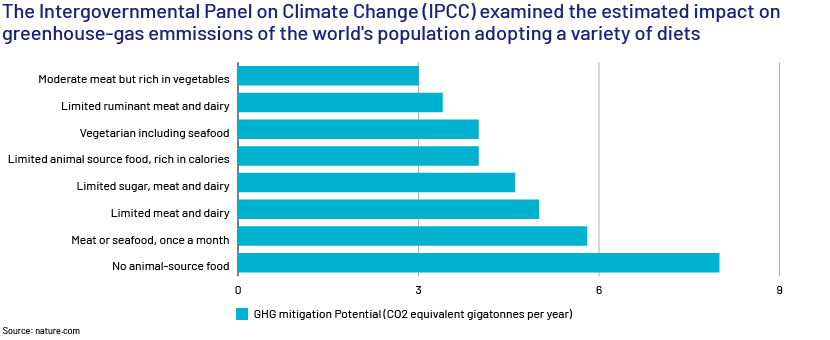
Conclusion
The current state of climate emergency demands extreme measures to contain harmful GHG emissions. A shift towards a plant-based diet not only reduces harmful emissions, but also saves other valuable resources such as land, water, forests and wildlife.
How Acuity Knowledge Partners can help
We offer unique and timely insights in the form of market outlook and country reports customised to meet client requirements. We are also experienced in both quantitative and qualitative research analysis. We support clients with deep-dive research on sectors ranging from consumer goods to healthcare, TMT and financial services. In the consumer goods sector, we help clients identify pre-investment opportunities and provide post-investment management services, assisting with financial modelling and valuation analysis.
Sources:
https://www.wri.org/blog/2019/04/6-pressing-questions-about-beef-and-climate-change-answered
https://plantbasednews.org/news/economics/plant-based-market-skyrocket/
https://plantbasednews.org/news/economics/plant-based-food-sales-exceeded-seven-billion/
https://www.ipcc.ch/2021/08/09/ar6-wg1-20210809-pr/
https://news.un.org/en/story/2021/08/1097362
https://gfi.org/wp-content/uploads/2021/05/COR-SOTIR-Plant-based-meat-eggs-and-dairy-2021-0504-1.pdf
https://www.nature.com/articles/d41586-019-02409-7
https://news.un.org/en/story/2021/03/1086822
Tags:
What's your view?
About the Author
Yamini has been with Acuity for the past ten years and is currently part of the Investment Banking team. With a focus on TMT and Consumer segments, she has supported US and Europe based bulge bracket banks in a range of products, including industry deep dives, comparable analysis, target research, and valuations. She holds a Masters in Commerce from University of Delhi and a Bachelors in Commerce from Shri Ram College of Commerce, University of Delhi.
Like the way we think?
Next time we post something new, we'll send it to your inbox







